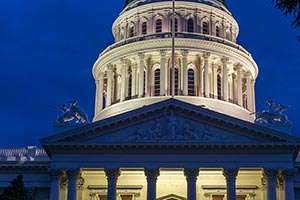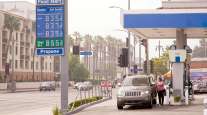Senior Reporter
Massive Transportation Infrastructure Bill Narrowly Approved by California Lawmakers

California legislators on April 6 narrowly approved a $52.4 billion, 10-year transportation bill to fix the state’s crumbling roads and bridges with revenues from hefty gas and diesel tax increases.
The transportation bill, which passed the state senate by a 27-11 margin and state assembly 54-26, calls for a 20-cent-per-gallon diesel fuel tax increase and 12-cent-per-gallon gas tax increase effective July 1 and a 4% increase of the state’s diesel sales and use surtax.
The bill had gained strong support from truckers, business and union leaders and California environmental regulators, but in the past week drew opposition from environmental groups that claimed a provision inserted in the bill would give truckers a significant break from future environmental regulations.
"Today, after decades of inaction, the legislature approved a fiscally responsible plan to address our decrepit transportation infrastructure,” California Democratic Senate President Pro Tempore Kevin de León said in a statement. “This bipartisan compromise includes strict accountability measures and closes our massive transportation funding shortfalls — without burdening future generations with debt.”
The bill includes two trucking-related provisions that were pushed by the California Trucking Association but drew quick opposition from environmentalists and some public nonprofits.
One of the provisions gives the California Air Resources Board the authority to deny registration of heavy trucks that are not in compliance with the state’s environmental regulations.
A second provision allows carriers to keep their trucks on the road for up to 13 years after the model year engine and emissions control system are first certified.
Shawn Yadon, CEO of the California Trucking Association, said the bill, supported by CTA, will force the estimated 30% of trucks not in compliance with CARB emissions reduction regulations to meet the standards and at the same time give fleets “predictability and certainty” of a return on their investments.
“When you look at this full package, SB 1, overall in balance has elements we feel very good about,” Yadon told Transport Topics.
However, environmental groups lined up in large numbers at a recent hearing on the bill to express opposition to the measure because they said the “useful life” amendment would give the trucking industry a significant break from future environmental regulations.
“This is a bitter poison pill from the trucking industry to commuters who are choking on diesel exhaust from trucks,” Adrian Martinez, a staff attorney for Earth Justice, said at a legislative hearing on April 3.
The legislation is expected to be signed quickly by California Democratic Gov. Jerry Brown, who pushed for its passage and said he was staking his legacy on the bill, which required a two-thirds majority of both legislative chambers.
“California has a massive backlog of broken infrastructure that has been neglected far too long,” Brown said recently. “Fixing the roads will not get cheaper by waiting — or ignoring the problem. This is a smart plan that will improve the quality of life in California.”
Brown said the roads investment increase would cost most drivers less than $10 a month extra, and includes accountability provisions to ensure funds can only be spent on transportation.
Some Republicans, significantly outnumbered in both chambers, expressed concerns that the tax increases will have a negative effect on the state’s affordability, particularly for its low-income and poor residents.
However, Stanley Young, a CARB spokesman, said the bill would result in large reductions in diesel soot and oxides of nitrogen emissions.
“This bill will deliver a powerful enforcement tool, that will help clean up these trucks,” Young told Transport Topics. “It would provide truck fleet owners that had invested in complying with the current regulation to amortize that investment over 13 years.”




